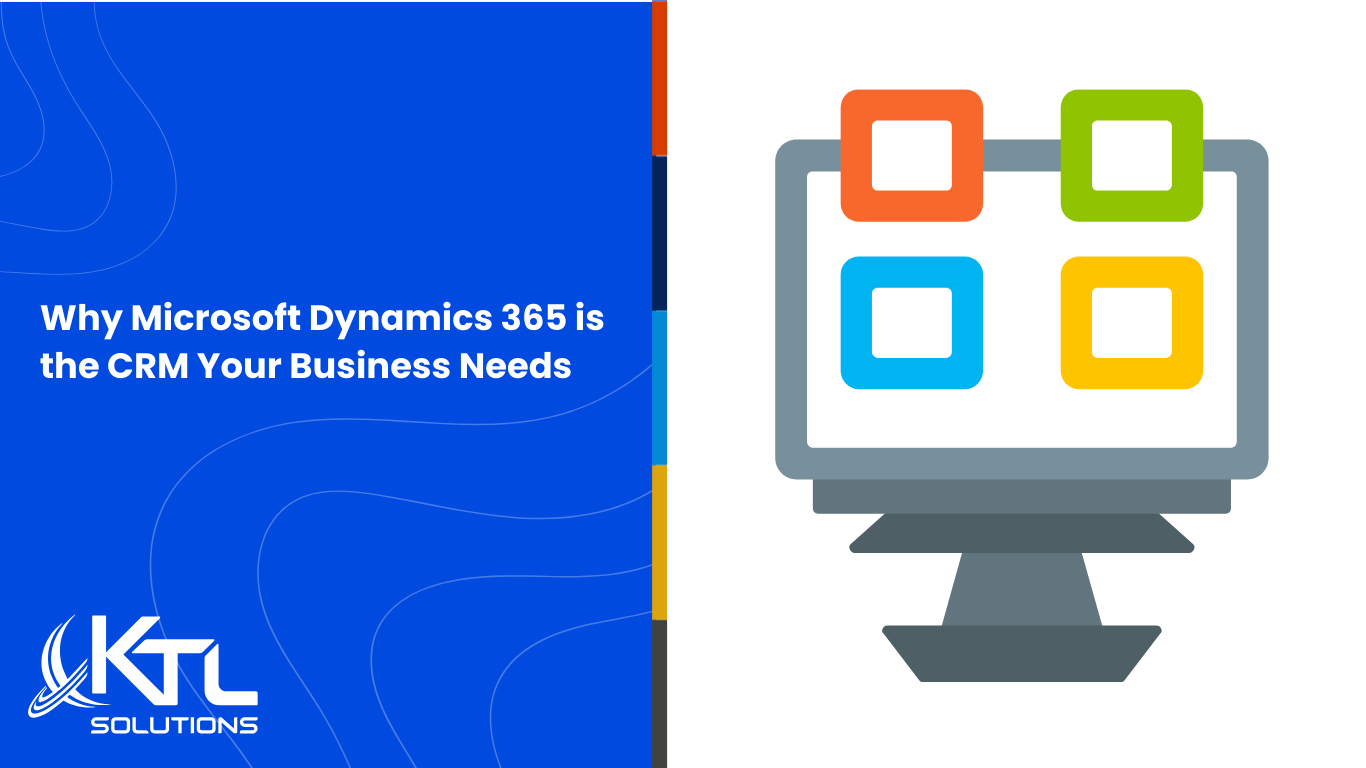KTL Solutions has been a Microsoft Dynamics Partner for over 15 years and we have implemented and now support hundreds of organizations on the Dynamics GP & SL platforms and we have recently added Dynamics 365 to our practice offering. It is no surprise that over the years most of those implementations have been On-Premise although new and existing clients are seriously evaluating and considering cloud deployments.
Products like Dynamics 365 started in the cloud and D365 is a Full Function ERP SaaS (Software as a Service) application. Whereas, GP/SL were developed as on-premise platforms although new technologies and enhancements have been made to GP & SL that make cloud hosting and deployments a viable option. We see cloud acceptance with our customers growing and our customers are moving more and more workloads to the cloud. Although, while many companies have already embraced ERP Cloud hosting there continues to be hesitancy by many organizations to migrate this workload to the cloud.
Our clients cover the entire spectrum of the cloud hosting journey – from I will never be in the cloud -to – I am considering the cloud -to – how quickly can I get in the cloud. We have seen customers that a year ago did not want to hear anything about the cloud to one day calling us and wanting to start this process. We have found there are many different factors that move a client through this journey but our goal has been to educate. With our education model our two key goals are correcting myths and misconceptions and outlining benefits.
Myths and Misconceptions are typical with new and innovative technologies and ERP Cloud Hosting is no exception. Knowing the truth is extremely important when deciding which path to take for your company. So, I have outlined some of the common myths in hopes I can debunk them:
- Only basic ERP functionality is available when you choose a hosted ERP solution. While this may have been true in the past and is still true today with other ERP Solutions the Microsoft Dynamics offerings provide the same full functionality as the proven Dynamics On-Premise applications. ERP Cloud deployments and applications provide all the ERP functions including finance management, procurement and sourcing, payroll and HR (HCM), supply chain management, production and manufacturing, project accounting, sales and marketing, business intelligence and much more. Bottom-line is that a cloud hosted Dynamic’s ERP platform is, in fact, on par with the functionality of onsite deployments.
- Customizing cloud hosted ERP solutions can’t be done. Basically, the belief is that cloud hosted platforms are not flexible and can’t be modified to meet specific and unique business needs. This is purely a myth because the Microsoft Dynamics applications offer broad based standardization but also provide companies the ability to configure and customize to meet their needs
- Integration between a hosted ERP system and other systems is a challenge. It is a well-known fact that businesses need to integrate and connect multiple systems to improve efficiency, increase employee productivity and maximize customer service. Frequently we are already integrating On-Premise ERP application to other On-Premise and Cloud hosted applications. So, the same integrations are possible if your ERP application is hosted in the cloud.
- If my Internet services goes down my ERP solution will not function. This is a very valid concern as all your hosted applications (i.e. Credit Card processing, VOIP phones, Email, E-commerce sites, etc..) are delivered via an internet connection. So, whether your ERP is hosted locally or in the cloud the key focus here is your organization’s internet reliability because more than likely your whole business will be down if your internet goes down. Internet stability has improved significantly in recent years, with notable improvements in consistent speeds and reduced number of outages. Key requirement here is to get an SLA with your ISP provider and consider contracting with a second ISP for failover and business continuity protection.
- Data is less secure in the cloud. Even though this list is not in order of importance I should have probably made this first, because this may be the most common issue we hear. In the past, many organizations were opposed to cloud ERP hosting, as they believed that having all the company’s data, infrastructure, software, and hardware onsite was by far the safest course. However, while security remains a key concern, as CIO’s and other C-Suite executives evaluate the level of security and compliance certifications that are available through Microsoft’s Azure cloud platform and other cloud hosting providers and compare that to the ongoing capital investments that would have to made to maintain that same level of infrastructure and data security levels they are reconsidering their position. The reality is that the current on-premise infrastructure and data security of most of our clients does not compare to the levels provided my Microsoft and other hosting providers and that is primarily due to the cost and scale of having to replicate the type of facilities and data centers required to provide the type of protection that you must have in today’s world.
As I mentioned earlier one of our goals is to educate our clients. Two components of our education model deal with myth busting and the other deals with providing benefits. So, I am going to shift gears from myth busting to now providing some benefits to ERP Cloud Hosting.
I indicated that Cloud adoption is growing across the SMB and Enterprise market and more and more companies are turning to ERP cloud hosting solutions. If your business is considering a move to the cloud, here are some benefits to consider:
- Lower Upfront Investment Costs- ERP cloud hosting service does not require a large upfront investment to purchase and maintain servers, secure housing, install, deploy, configure, and maintain software. Onsite solutions not only involve higher costs but also more time and effort, requiring businesses to hire a full time IT staff to maintain the system. For these reasons, ERP cloud hosting is especially advantageous to smaller businesses, those on tight budgets, and companies with limited IT resources.
- Faster ROI on IT Spend– Most cloud hosted applications including ERP solutions can be integrated relatively quickly, creating a faster return on the investment. Fast integration also equals a lower total cost of ownership (TCO) over the entire span of the investment.
- Automatic Software Upgrades– As we all know with on-premise ERP solutions, software updates are released maybe twice a year (some applications less frequently) which means you must wait for the latest features, upgrades, and newest security patches. Each time the new version is released and you want to install in your environment, the process can be costly, complex, and disruptive, forcing your organization to review if the updates are worth the hassle. For those clients that don’t upgrade and stay current they are lots of features and functionality that are not benefitting their organizations. With cloud hosted ERP SaaS applications, feature and security upgrades are released monthly and your ERP environment and software is upgraded in an unobtrusive way allowing your employees to have access to the latest technology and features available to do their best work.
- Reduce Your Dependence on Internal IT Resources- Since you have either no or certainly less IT infrastructure (no Servers) cloud hosting usually requires fewer technical resources than on- premise applications. Using cloud hosted ERP does not mean you are eliminating your IT department if one exists in your organization, it just means that your IT staff can now focus on other tasks that are more strategically aligned with your business goals.
- Flexibility and Scalability- This is certainly a key benefit of a Cloud-hosted ERP solution as your solution can change quickly to meet your ever-changing business needs. You can add or remove users on demand, as well as, increasing or decreasing database and server configurations to suit your growing business needs very quickly. For seasonal or cyclical businesses this can be very important.
So, let me summarize. I hope I debunked some of the myths about cloud hosted ERP Solutions and that you have a clear understanding that – that Microsoft’s Dynamics cloud hosted ERP systems are highly functional, customizable, integrated, stable and secure. Additionally, that you see some the benefits of switching to a cloud hosted ERP solution would be – Low initial capital investment, Fast ROI, always on the current version, reduced dependence on IT staff and increased flexibility.
Given some of these benefits and many advantages of ERP cloud hosting, we find that businesses across various industry segments are starting to take notice. Perhaps it’s time you do so too. If you’re seriously contemplating a move to the cloud please do not hesitate to contact me sreid@ktlsolutions.com




































